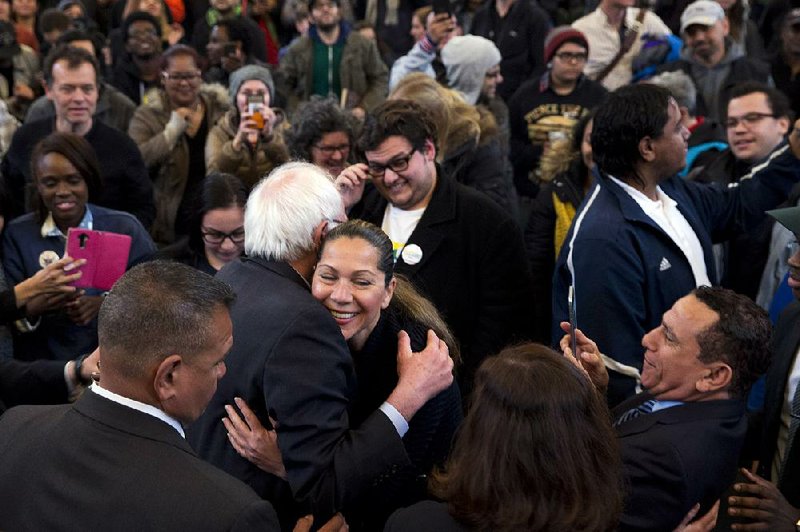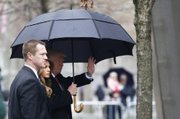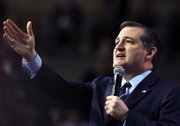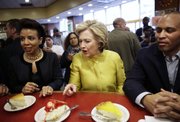Sen. Bernie Sanders of Vermont won the Wyoming Democratic caucuses Saturday, continuing a string of victories across the West but failing to chip away at Hillary Clinton's delegate lead before a primary in New York next week.
FULL ELECTION COVERAGE
Sanders got word of his Wyoming win from his wife, Jane, midway through a rally in Queens, part of a four-stop swing through New York City.
His supporters leapt to their feet and gave him a standing ovation. He thanked Wyoming voters but said with a smile, "There are probably more people in this room than there are in Wyoming."
Sanders beat Clinton statewide by about 11 percentage points, though the end result was essentially a tie, as each candidate took seven of Wyoming's 14 pledged delegates, the fewest any state had to offer. Clinton's nationwide lead remained at 219.
But coming after Sanders' recent big victories in Washington state, Alaska, Idaho, Utah, Hawaii and Wisconsin, it was more evidence of Clinton's weaknesses among white and liberal voters as the race moves to primaries in New York and elsewhere in the Northeast.
It was the only contest Saturday for the Democrats.
In Colorado, Republicans finished their final round of voting at their state party convention in Colorado Springs. Sen. Ted Cruz of Texas completed his sweep of Colorado's 34 delegates, netting 13 more delegates at Colorado's GOP convention. Cruz already had locked up the support of 21 Colorado delegates and visited the state to try to pad his numbers there.
Like Sanders, Cruz still trails the front-runner in his race, Donald Trump. And the campaign now moves to territory likely to be more favorable to Trump.
Though Sanders was favored in the Wyoming Democratic race, Clinton, as she has in most states, had endorsements from more elected officials, and the state's four superdelegates are supporting her. In 2008, she lost to Barack Obama in Wyoming by 24 percentage points.
The state was exactly the type of contest she struggles in. It is mostly white, and it uses a caucus format. Clinton did not campaign in Wyoming, choosing instead to devote time and resources to the delegate-rich primaries in New York on April 19 and Pennsylvania on April 26.
New York, Clinton's adopted home state and Sanders' birth state, could be the setting that lets her reclaim the momentum and take a big step toward making her delegate lead insurmountable. Its more diverse population and its more traditional primary method of voting make the state friendlier territory for Clinton.
Clinton said Saturday at a rally in Brooklyn that she wants to "send a strong message" in the state's primary and start unifying the Democratic Party, and she urged New Yorkers to help lock up the Democratic nomination so "we can go after the Republicans full time."
In Manhattan on Saturday, Sanders invoked the name of Pope Francis during a campaign appearance at which he touted his own advocacy of a "moral economy" and challenged Clinton to endorse his plan to expand Social Security benefits by raising taxes on the wealthy.
"I must tell you that I am a very great fan of the role that Pope Francis has been playing in talking about inequality in this world," Sanders told the crowd after relaying his plans for a trip to the Vatican. "He has been out there talking about the need for a moral economy ... an economy in which we have a moral responsibility to pay attention to what he calls 'the dispossessed.'"
He then pivoted to the subject of expanding benefits for senior citizens struggling to get by on Social Security. Sanders touted his plan to raise taxes on those making $250,000 or more, a move that he said would extend the life of the program and allow for an increase in benefits for those with the greatest need.
"Secretary Clinton really has avoided this issue," Sanders said. "She's talked about it in generalities."
The Clinton campaign did not immediately respond to those comments.
Clinton has said that her plans for Social Security and Medicare focus on preventing further cuts, reducing costs and expanding benefits for the poorest recipients -- especially widowed and single women.
She has said she would consider lifting a cap on taxable income, as Sanders advocates, and also consider taxing investment income to pay for expanded benefits. But she has not gone as far as Sanders in making those taxes part of her plan.
The only reaction to Sanders' Vatican trip from the Clinton campaign has been a message on Twitter from spokesman Brian Fallon, who said "holy smokes" in response to a since-revised report that Sanders had invited himself to the Vatican.
Sanders plans to depart for the Vatican almost immediately after the debate Thursday in New York with Clinton, a former secretary of state and U.S. senator representing New York.
It remains unclear whether Sanders, who was born in Brooklyn, will meet with Francis.
In a telephone interview, the Rev. Federico Lombardi, the senior Vatican spokesman, said the invitation to Sanders did not come from the pope and that he was unaware of whether the pontiff had been informed before the offer was extended.
Rather, the invitation came via the hand of an influential Argentine cleric in Vatican City, Monsignor Marcelo Sanchez Sorondo, who heads the Pontifical Academy of Sciences.
Sorondo, a key figure who helped shape the Vatican's position on climate change, said in an interview that he invited Sanders because he has been outspoken on some of the issues being discussed at the conference and Sanders has quoted the pope previously. He said he is "very glad" Sanders accepted.
"I would have invited Hillary Clinton, too, if I thought she would accept," Sorondo said, adding that he did not consult the pope on the Sanders invitation.
convention calculations
On the Republican side, Cruz said at the Colorado Springs convention that it's easy to talk about making America great again -- "you can even print that on a baseball cap" -- but that the more important question is which candidate understands "the principles and values that made America great in the first place."
Cruz, who secured the support of a majority of Colorado delegates who will attend the Republican National Convention in July, is trying to deny Trump enough delegates for a first-ballot nomination in Cleveland.
As of late Friday, Trump led the delegate race with 743, according to Associated Press estimates. Cruz had 520, while Ohio Gov. John Kasich lagged far behind at 143.
"You all have been a part of something incredible that has happened over the last three weeks," Cruz said at the convention, as he reflected on recent victories in Utah and Wisconsin. Cruz was the only candidate to speak at the convention.
The 37 delegates from Colorado are a small fraction of the 1,237 needed to win. Yet with the likelihood of a contested national convention on the rise, a handful of delegates could make a difference, and the competition for their selection has taken on much greater significance than traditionally has been the case.
Instead of holding a statewide primary or caucus like most states, Colorado employs a series of local, congressional-district and statewide gatherings where people compete to be delegates. That monthslong process wrapped up Saturday.
Later, in Las Vegas, Cruz tried to persuade a group of Republican donors and Jewish leaders to support him. Cruz detoured from next-to-vote New York to speak to the Republican Jewish Coalition, while Trump and Kasich declined the group's invitations.
The coalition is funded partly by 2012's largest political donor, billionaire Sheldon Adelson, whose casino resort hosted the event.
Cruz also drew a sharp contrast with Trump, reminding attendees that Trump had recently said he would remain "neutral" between the Palestinians and Israelis. Cruz said that as president, he will not be neutral.
Trump left the Colorado convention to his organizers and spent about a half-hour Saturday touring the National Sept. 11 Memorial and Museum in lower Manhattan. His campaign issued a statement describing the site as "symbolic of the strength of our country, and in particular New Yorkers, who have done such an incredible job rebuilding that devastated section of our city."
"This is what 'New York values' are really all about," it added, a not-too-veiled poke at Cruz, who has taken heat for his earlier criticism of "New York values."
Kasich also was campaigning in New York.
Information for this article was contributed by Yamiche Alcindor and Amy Chozick of The New York Times; by Nicholas Riccardi, Jill Colvin, Kathleen Ronayne, Rachelle Blidner, Stephen Ohlemacher and Hope Yen of The Associated Press; and by John McCormick and Jennifer Oldham of Bloomberg News.
A Section on 04/10/2016



